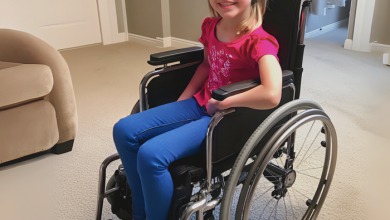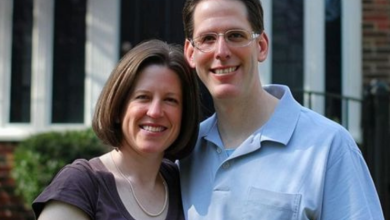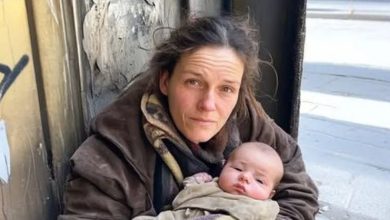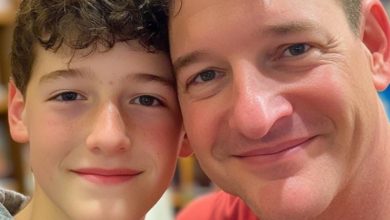The surgeons refused to operate on the sick orphan. But when the nurse walked into the operating room… the entire staff burst into tears at what she did.
“When all hope seemed lost… she appeared.”
The small hospital room was wrapped in semi-darkness. The dim light from a bedside lamp barely illuminated the girl’s face. She had just turned fifteen, but life had already given her more pain than most adults could endure. Emily had lost her parents in a tragic accident, and the orphanage had become her home. Now—this hospital.

A sudden, stabbing pain in her chest had brought her to the municipal clinic. The doctors reviewed her charts, her scans… and walked away.
— “The prognosis is extremely poor. Surgery is nearly impossible. She won’t survive the anesthesia. It’s hopeless,” sighed one of the surgeons, removing his glasses.
— “And who’s going to sign the consent? She has no one. No one’s waiting for her. No one’s looking after her,” the nurse added softly.
Emily had heard it all. She lay still under the blanket, eyes closed, trying to hold back her tears. But she had no strength left to cry—everything inside her felt frozen. She was tired of fighting.
Two days passed in silence and uncertainty. The doctors walked past her door, whispered among themselves, but made no decisions.
And then, one quiet night, when the hospital seemed asleep, the door creaked open. An elderly nurse entered. Her hands were lined by time, her uniform faded—but her eyes… her eyes shone with a warmth that Emily felt even without looking.
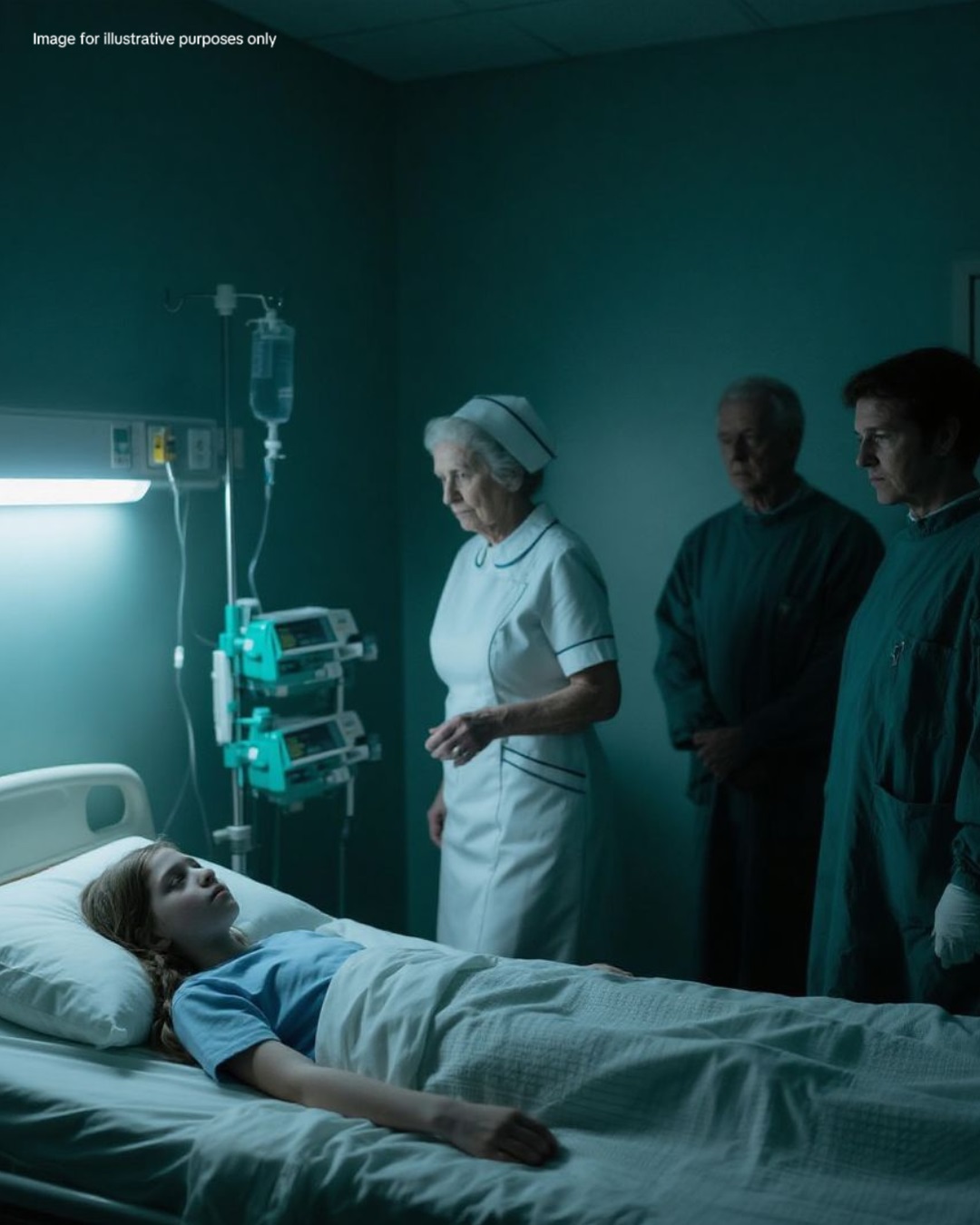
— “Hi, sweetheart. Don’t be afraid. I’m here. Mind if I sit with you for a while?”
Emily slowly opened her eyes. The woman sat beside her, placed a small cross pendant on the nightstand, and began to softly whisper a prayer. She gently wiped Emily’s forehead with an old handkerchief. She didn’t ask questions. She didn’t speak in clichés. She simply… stayed.
— “My name is Margaret Anne. And yours?”
— “Emily…”
— “What a beautiful name… My granddaughter’s name was Emily too…” the woman’s voice trembled briefly. “But she’s gone now. And you, my dear… you’re mine now. You’re not alone anymore. Do you understand?”
The next morning brought something no one could have expected.
Margaret Anne arrived at the department holding notarized documents. She had signed the surgical consent form—becoming Emily’s temporary legal guardian.
The doctors were stunned.
— “Do you understand the risk you’re taking?” the hospital director asked her. “If something happens—”
— “I understand perfectly, my dear,” Margaret said in a calm but unwavering tone. “I have nothing to lose. But she… she has a chance. And I want to be that chance. And if you, with all your knowledge, no longer believe in miracles—well, I still do.”
The surgery lasted six and a half hours. Everyone waited in tense silence. Margaret sat in the hallway, eyes locked on the doors of the operating room. In her hands she held a handkerchief embroidered with a flower—the same one her granddaughter had stitched long ago.
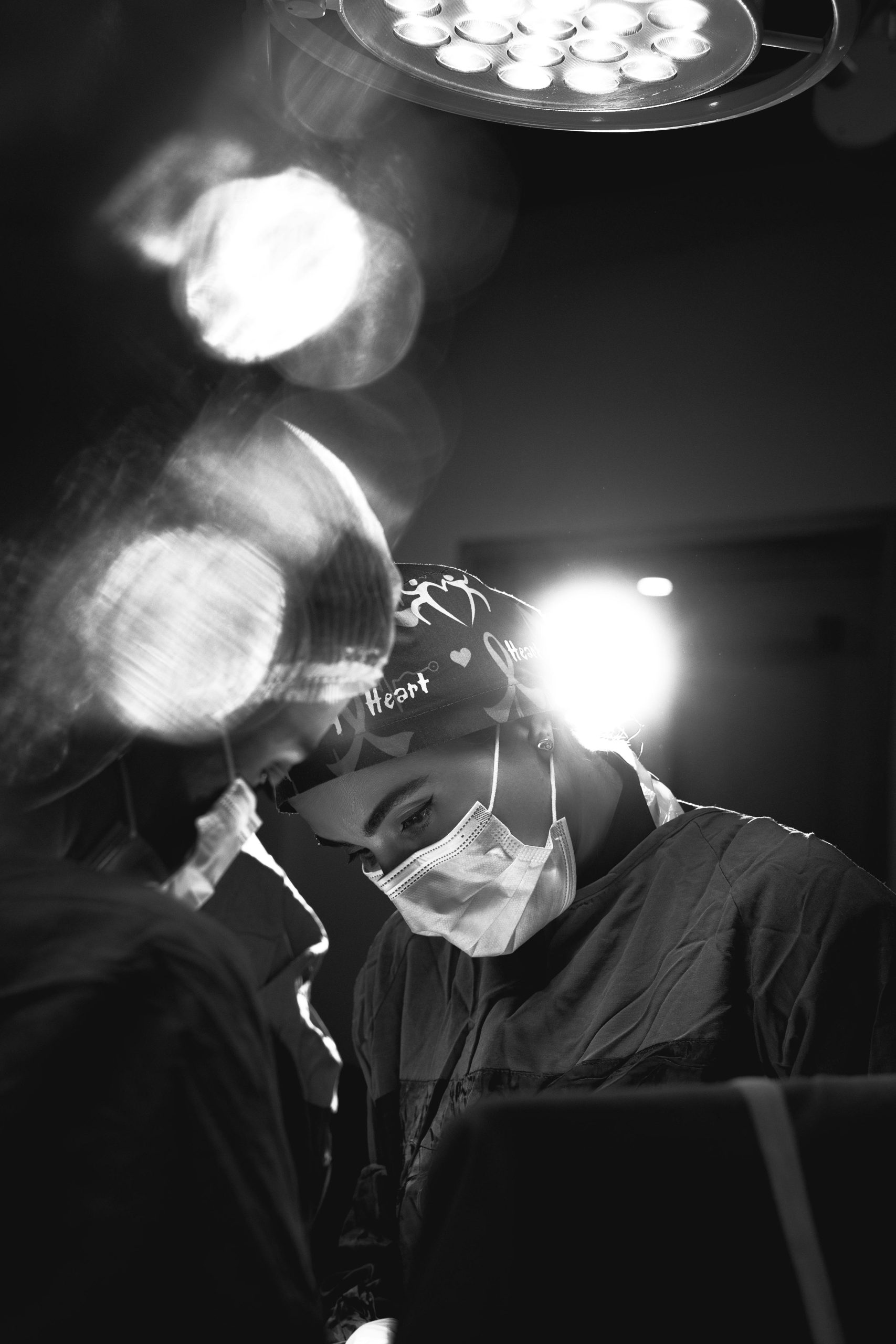
When the surgeon finally emerged, his eyes were red with exhaustion…
The surgeon looked up from his mask, his voice low and hoarse. “She made it.”
The words seemed to hang in the air like a fragile echo. Margaret Anne stood slowly, hand pressed to her chest. Her knees felt weak, but her spirit surged with something she hadn’t felt in years—hope.
“She made it?” she whispered.
The doctor nodded, visibly shaken. “We nearly lost her twice. But something… something pulled her through.”
Margaret Anne closed her eyes and whispered a silent prayer, clutching the handkerchief tighter in her wrinkled fist.
Three days later, Emily opened her eyes. Blinking slowly at the ceiling lights, she reached weakly for the call button.
But she didn’t need to press it.
Margaret was already there, seated by her bed, knitting a pair of tiny wool mittens—just like she used to for her granddaughter long ago.
“You stayed,” Emily croaked.
“Of course I did,” Margaret said, her smile soft. “I told you, you’re mine now. You’re not alone anymore.”
Tears welled in the girl’s eyes. Not from pain this time, but from the strange, overwhelming comfort of being seen—of being loved.
Word spread quickly throughout the hospital. Doctors, nurses, even janitorial staff began stopping by Room 206 to check on “the miracle girl and the nurse who wouldn’t give up.” Some brought books, flowers, even a donated tablet with educational games. The hospital had seen many things—but not this.
Some couldn’t stop talking about the surgery itself. How her heart had stopped. How her body had turned pale. How she’d come back.
“She shouldn’t have survived,” whispered Dr. Bennett to one of the junior residents.
“Then maybe we don’t know everything,” the resident replied, quietly glancing down the hall toward Emily’s room.
Margaret Anne stayed at the hospital long after her shifts ended. At first, it was just to watch over Emily. But soon, the girl began asking her questions. About life. About faith. About Margaret’s granddaughter, the one who shared her name.
“She was ten when we lost her,” Margaret said one night as she brushed Emily’s hair. “A drunk driver. A rainy highway.”
Emily looked down at the handkerchief on the nightstand. “That’s why you carry this?”
Margaret nodded. “It was the last thing she ever made. A clumsy little flower, half-stitched. I couldn’t finish it. It had to stay the way she left it.”
Emily didn’t say anything. But later, when Margaret stepped out for tea, a nurse found the girl trying to sew. Her hands trembled from weakness, but she was threading a needle with fierce determination.
Weeks passed. Emily’s strength returned, slowly but surely. Margaret helped her with physical therapy, encouraging her with gentle words and unwavering presence.
One morning, as the leaves outside turned to fire-orange and golden-red, a social worker named Linda Carter came to see Margaret.
“You understand what this means, don’t you?” she asked.
Margaret nodded.
“You’re nearly eighty. Taking on guardianship of a teenager—it’s… uncommon. Challenging.”
“I’ve faced worse,” Margaret said softly. “And she’s worth it.”

Linda studied her face, then opened her folder. “Well, the judge thinks so too. Your petition for long-term guardianship has been approved.”
Margaret blinked. “You mean…”
“You’re officially her guardian now.”
Margaret’s hands trembled. “She’s… mine?”
Linda smiled. “Yes. And she’ll be placed in your custody as soon as she’s discharged.”
Outside the room, two nurses—one with teary eyes—clapped silently. Inside, Margaret sat by Emily’s bed, tears rolling down her cheeks.
“You’re going home, sweetheart,” she whispered. “And this time… with family.”
Moving in together wasn’t easy. Margaret lived in a modest two-bedroom house in Maple Grove, a quiet neighborhood in Ohio. Her pension was limited, and Emily’s trauma didn’t disappear overnight.
But love has a way of transforming what little we have into enough.
Margaret converted her late husband’s office into Emily’s bedroom. They painted it together—lavender walls, a sky-blue ceiling. They planted a garden in the backyard, just two rows of vegetables and wildflowers. Margaret taught Emily to cook, to knit, and to ride the old bicycle that had been sitting untouched for over a decade.
Emily taught Margaret how to use email. How to stream movies. How to laugh again.
They had rough days. Nightmares. Doctors’ appointments. Lingering medical bills.
But they faced them together.
One snowy Sunday, Margaret brought Emily to church for the first time since her recovery. The small congregation, many of whom had prayed for “that girl from the clinic,” stood and applauded when she entered.
Emily, overwhelmed, hid behind Margaret’s coat.
But after the service, she stood at the back of the sanctuary and whispered, “Do you think… it was your granddaughter? The one who helped me come back?”
Margaret looked at the handkerchief Emily now kept folded in her jacket pocket.
“I think she sent me to you,” she said softly. “And maybe, just maybe, you’re my miracle too.”

On the one-year anniversary of the surgery, the hospital invited Margaret and Emily to speak at a charity banquet. Dressed in a simple navy dress and wearing her first pair of high heels, Emily stood beside Margaret and told the story—not of her illness, but of the woman who chose her when no one else would.
“She gave me life twice,” Emily said, voice steady. “Once in the hospital, and once when she decided I was worth loving.”
There wasn’t a dry eye in the room.
After the speech, Dr. Bennett hugged both of them.
“I’ve practiced medicine for thirty years,” he whispered, “and I’ve never seen anything like this.”
Margaret smiled. “That’s because it wasn’t just medicine. It was love.”
Back home, Emily stitched the final thread into a new handkerchief. The flower now complete—just like the one her namesake had started.
She left it on Margaret’s nightstand with a note:
“For everything you finished that no one else would.”
And as Margaret read it, tears welled in her eyes again. Not from grief. Not from loss. But from a fullness of heart that only comes when love chooses you—when family is made, not inherited.
Because sometimes, miracles don’t come in bursts of light.
Sometimes, they walk in wearing scrubs and carrying a flower-stitched handkerchief.
This piece is inspired by stories from the everyday lives of our readers and written by a professional writer. Any resemblance to actual names or locations is purely coincidental. All images are for illustration purposes only.


